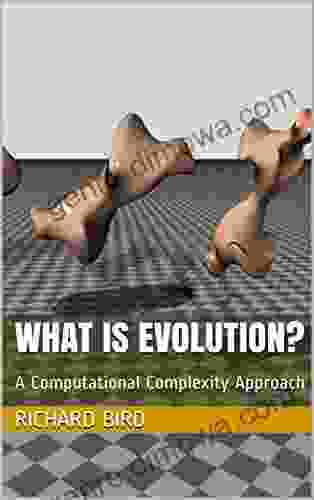What Is Evolution: Computational Complexity Approach

Unraveling Nature's Algorithmic Secrets
In a world of constant adaptation and innovation, evolution stands as a testament to nature's remarkable ability to solve complex problems. From the evolution of life itself to the intricate workings of the human brain, nature's algorithms have inspired countless technological advancements.
The field of computational complexity seeks to quantify the inherent difficulty of computational problems, providing a framework for understanding the limits of computation. By combining these concepts, the computational complexity approach to evolution unlocks a deeper understanding of the algorithmic nature of evolutionary processes.
4.8 out of 5
| Language | : | English |
| File size | : | 2545 KB |
| Text-to-Speech | : | Enabled |
| Screen Reader | : | Supported |
| Enhanced typesetting | : | Enabled |
| Word Wise | : | Enabled |
| Print length | : | 108 pages |
| Lending | : | Enabled |
"What Is Evolution: Computational Complexity Approach" is a groundbreaking work that delves into this fascinating intersection of biology and computer science. This comprehensive guide explores the theoretical foundations, cutting-edge applications, and transformative potential of this captivating field.
Key Features
- In-depth Theoretical Foundation: Equips readers with a solid understanding of the computational complexity theory and its relevance to evolutionary processes.
- Comprehensive Application Overview: Highlights the diverse applications of the computational complexity approach in fields such as molecular evolution, population genetics, and artificial intelligence.
- Cutting-Edge Research Insights: Provides a glimpse into the latest advancements in the field, showcasing novel approaches and groundbreaking discoveries.
- Engaging Case Studies: Illustrates the practical applications of computational complexity in real-world scenarios, making complex concepts accessible.
- Future Directions and Open Problems: Examines the frontiers of the field, outlining promising research avenues and unresolved challenges.
Benefits for Readers
"What Is Evolution: Computational Complexity Approach" offers a wealth of benefits for readers, including:
- Deepen Their Understanding of Evolution: Gain a profound appreciation for the algorithmic nature of evolutionary processes, enriching their knowledge of biology.
- Expand Their Computational Expertise: Acquire advanced skills in computational complexity theory, enhancing their problem-solving abilities and computational understanding.
- Stay at the Forefront of Innovation: Discover the latest advancements in the field, enabling readers to contribute to the ongoing evolution of computational complexity in evolution.
- Ignite Their Passion for Interdisciplinary Research: Foster a passion for exploring the intersections of diverse disciplines, leading to groundbreaking discoveries and transformative applications.
Applications and Impact
The computational complexity approach to evolution has far-reaching applications across various fields, including:
- Molecular Evolution: Understanding the computational complexity of gene duplication, mutation, and recombination events can provide insights into the evolution of genetic systems.
- Population Genetics: Analyzing the computational complexity of population genetic models can help predict population dynamics and genetic diversity.
- Artificial Intelligence: The computational complexity approach can guide the design of efficient algorithms for evolutionary optimization and machine learning tasks.
- Systems Biology: Exploring the computational complexity of biological systems can lead to novel approaches for understanding complex biological networks and processes.
- Medicine and Biotechnology: The computational complexity approach can contribute to the development of personalized medicine and the optimization of biotechnological processes.
"What Is Evolution: Computational Complexity Approach" is an essential resource for anyone interested in the intersection of evolution and computation. This comprehensive guide provides a deep understanding of the field, showcasing its theoretical underpinnings, cutting-edge applications, and transformative potential. By exploring the algorithmic nature of evolutionary processes, readers gain a profound appreciation for nature's ingenious problem-solving strategies and drive scientific advancements that benefit society. Whether you are a biologist, computer scientist, engineer, or simply curious about the mysteries of evolution, this book is an invaluable tool for expanding your knowledge and igniting your passion for interdisciplinary research.
4.8 out of 5
| Language | : | English |
| File size | : | 2545 KB |
| Text-to-Speech | : | Enabled |
| Screen Reader | : | Supported |
| Enhanced typesetting | : | Enabled |
| Word Wise | : | Enabled |
| Print length | : | 108 pages |
| Lending | : | Enabled |
Do you want to contribute by writing guest posts on this blog?
Please contact us and send us a resume of previous articles that you have written.
 Book
Book Novel
Novel Page
Page Chapter
Chapter Text
Text Story
Story Genre
Genre Reader
Reader Library
Library Paperback
Paperback E-book
E-book Magazine
Magazine Newspaper
Newspaper Paragraph
Paragraph Sentence
Sentence Bookmark
Bookmark Shelf
Shelf Glossary
Glossary Bibliography
Bibliography Foreword
Foreword Preface
Preface Synopsis
Synopsis Annotation
Annotation Footnote
Footnote Manuscript
Manuscript Scroll
Scroll Codex
Codex Tome
Tome Bestseller
Bestseller Classics
Classics Library card
Library card Narrative
Narrative Biography
Biography Autobiography
Autobiography Memoir
Memoir Reference
Reference Encyclopedia
Encyclopedia Mark Brake
Mark Brake L Blaise Hues
L Blaise Hues Mary Blewitt
Mary Blewitt Steve Springer
Steve Springer Thomas Wold
Thomas Wold Michael O Hearn
Michael O Hearn Priscilla Endicott
Priscilla Endicott Julie Fain Lawrence Edsell
Julie Fain Lawrence Edsell P G Wodehouse
P G Wodehouse Michael Hutchison
Michael Hutchison Lauren Gilley
Lauren Gilley Kurt Gaubinger
Kurt Gaubinger Sotiris Bakanakis
Sotiris Bakanakis Lawrence Bransby
Lawrence Bransby Robert P Crease
Robert P Crease Lauren Destefano
Lauren Destefano Kyle Keiderling
Kyle Keiderling Larry Kaniut
Larry Kaniut Brian Keaney
Brian Keaney Tris Dixon
Tris Dixon
Light bulbAdvertise smarter! Our strategic ad space ensures maximum exposure. Reserve your spot today!

 Jake CarterDelve into the Profound Insights of Consumer Behavior: Qualitative Consumer...
Jake CarterDelve into the Profound Insights of Consumer Behavior: Qualitative Consumer... John UpdikeFollow ·16.2k
John UpdikeFollow ·16.2k Rubén DaríoFollow ·9.7k
Rubén DaríoFollow ·9.7k Juan RulfoFollow ·3.8k
Juan RulfoFollow ·3.8k Jace MitchellFollow ·8.2k
Jace MitchellFollow ·8.2k Gerald ParkerFollow ·14.8k
Gerald ParkerFollow ·14.8k Camden MitchellFollow ·7.5k
Camden MitchellFollow ·7.5k Victor HugoFollow ·19.9k
Victor HugoFollow ·19.9k Esteban CoxFollow ·12.2k
Esteban CoxFollow ·12.2k

 Langston Hughes
Langston HughesUnlock Your Teaching Dreams with Nystce Mathematics 004...
Elevate Your Preparation...

 Finn Cox
Finn CoxUnlock Your Mtel Music 16 Certification: A Comprehensive...
: Embark on the Path...

 Calvin Fisher
Calvin FisherThe Unforgettable Journey of Self-Discovery in "Out of...
An Extraordinary Journey of Growth and...

 Isaiah Price
Isaiah PriceWhy Am I So Happy Dating With a Bolivian Girl?
I've been dating my...

 Junichiro Tanizaki
Junichiro TanizakiVolume: The Hole Inside the Earth - Discover the...
Delve into the...
4.8 out of 5
| Language | : | English |
| File size | : | 2545 KB |
| Text-to-Speech | : | Enabled |
| Screen Reader | : | Supported |
| Enhanced typesetting | : | Enabled |
| Word Wise | : | Enabled |
| Print length | : | 108 pages |
| Lending | : | Enabled |












